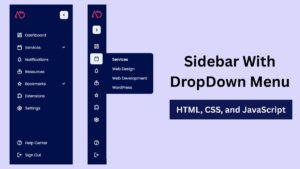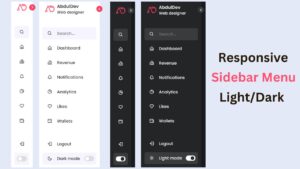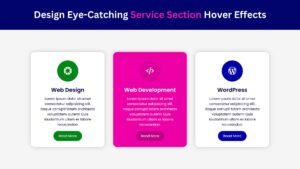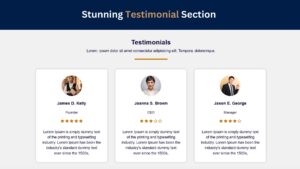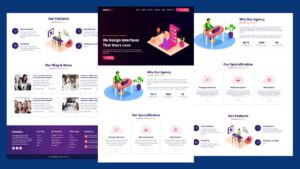
Why Page Speed Optimization Service is Vital for Your Website
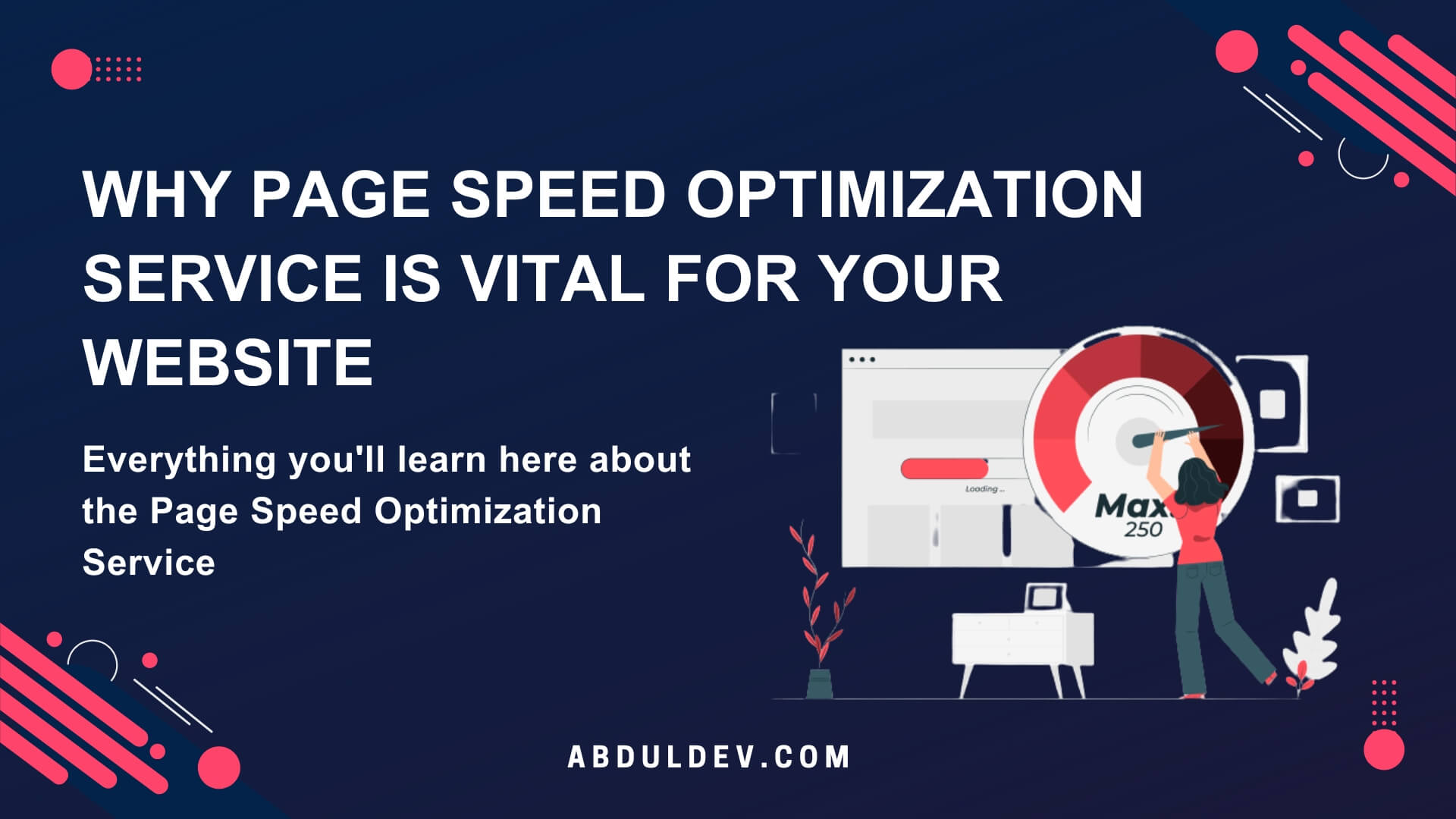
In the fast-paced digital world, a website’s performance is paramount. Among the many factors contributing to a website’s success, page speed optimization holds a significant place. This article delves into why investing in a page speed optimization service is vital for your website and how it can transform your online presence.
The Importance of Page Speed
In today’s fast-paced world, people want information instantly and don’t want to wait for slow websites to load. The slow loading speed can lead to frustrated visitors who may leave your site without viewing the content you’ve worked hard to produce.
This high bounce rate can hurt your search engine rankings and ultimately your bottom line. The loading speed of your website is also crucial for the user experience. A slow website can cause a lot of frustration, leading to a negative experience for the user. Slow load times can also impact performance issues like server response time, which affects how quickly your website responds to requests.
In addition, page speed insights also play an essential role in SEO. Google has been using loading speed as a ranking factor for several years. Therefore, if your website could be faster, it could harm your search engine rankings. Visitors will soon move on to a quicker site if your website loads quickly, leading to lower conversions and revenue. To combat these issues, consider investing in a page speed optimization service. This speed service uses strategies such as image optimization, lossless compression, Gzip compression, content delivery network (CDN), cache plugin, and optimizing CSS files.
Investing in WordPress speed optimization or similar services can offer a range of benefits, such as improved user experience, better search engine rankings, and increased conversion rates. These benefits are why it’s essential to consider your website’s loading speed and to ensure that it’s optimized to the best of your ability.
A slow website can frustrate visitors, impact performance issues, and hurt your search engine rankings. Investing in a page speed optimization service is an intelligent move to combat these issues. With the right approach and a commitment to improving your website’s loading speed, you can improve user experience, boost your search engine rankings, and drive conversions. Read more about the top 9 WordPress speed optimization plugins.
What is Page Speed Optimization Service?

Page Speed Optimization Service is a service that helps improve the loading time of your website’s pages. It involves analyzing your website’s speed using tools such as Speed Test to identify page load time issues.
One of the primary culprits of slow loading speeds is your Hosting Provider, which can result in a poor user experience and affect your search engine rankings. With Page Speed Optimization Service, the professionals use various techniques to optimize your website’s speed, including image optimization, code optimization, caching, and minimizing HTTP requests. The service providers also work to ensure your website is mobile-friendly, given that more users access the internet on their mobile devices.
Investing in Page Speed Optimization Service is essential for your website to deliver a better user experience, enhance your search engine rankings, and increase conversion rates. With professional assistance, your website’s pages load faster, keeping users engaged and improving your online presence.
Benefits of Page Speed Optimization Service
Investing in page speed optimization services for your website can have a range of benefits for your online presence. Here are some of the critical benefits of prioritizing page speed:
- Improved User Experience: When your website loads quickly, users are likelier to stay on and engage with your content. Slow loading times can frustrate users, leading to increased bounce rates and decreased engagement.
- Better Search Engine Rankings: Search engines like Google prioritize websites with faster loading times, as they provide a better user experience. Investing in page speed optimization can help improve your website’s search engine rankings, making it more visible to potential customers.
- Increased Conversion Rates: A faster-loading website can also increase conversion rates, as users are more likely to complete purchases or sign up for your services when they don’t have to wait for pages to load.
- Mobile Optimization: Page speed optimization is crucial for mobile users, who often access your website on the go and may have limited data plans. By optimizing your website for mobile devices, you can ensure that users can access your site quickly and easily from any device.
Overall, page speed optimization can significantly impact your website’s success and overall online presence. Investing in this service to improve your user experience, search engine rankings, conversion rates, and mobile optimization is worth investing in.
Improved User Experience
Page speed is an essential factor that can significantly impact the user experience of your website visitors. A website that loads quickly provides a seamless browsing experience to users, making it more likely for them to stay longer on your site, explore more pages, and ultimately convert into paying customers. In contrast, a slow website with longer load times can be frustrating, leading users to abandon the site and seek faster alternatives.
With page speed optimization service, your website can deliver a superior user experience by reducing load times and improving overall performance. By implementing various speed optimization techniques like image compression, browser caching, and minimizing HTTP requests, your website can load faster, providing users a smoother, more engaging browsing experience.
By prioritizing the user experience through improved page speed, you can also increase user engagement on your site, resulting in increased time spent, more pages visited, and a higher likelihood of converting leads into paying customers.
Furthermore, user experience plays a crucial role in search engine optimization. Search engines like Google place high importance on user experience when ranking websites. If your website provides a superior user experience, it can lead to better search engine rankings, driving more traffic and potential customers to your site.
Overall, improving the page speed of your website can positively impact the user experience, leading to increased engagement, conversion rates, and better search engine rankings. By working with a page speed optimization service, you can ensure your website provides visitors with a seamless, user-friendly browsing experience. Get more information about types of SEO.
Better Search Engine Rankings
One of the main benefits of investing in a page speed optimization service is the potential to achieve better search engine rankings. Search engines like Google have clarified that they value fast-loading websites and consider page speed when determining search rankings.
This means websites that load quickly have a higher chance of ranking in search engine results pages (SERPs). A study by Google found that a delay of just one second in page load time can decrease user satisfaction by 16% and result in a 7% reduction in conversions. If your website takes too long to load, it’s not just frustrating for your visitors. Still, it’s also hurting your chances of ranking well in search engines and ultimately generating more traffic and revenue for your business.
By investing in a page speed optimization service, you can identify and fix any issues that may be slowing down your websites, such as bloated code, uncompressed images, and excessive plugins. This helps you improve your page speed and boost your search engine rankings, leading to more visibility, traffic, and revenue for your business.
It’s important to note that while page speed is just one of many factors that search engines consider when ranking websites, it’s a crucial one that should be addressed. By improving your page speed, you’ll make your website more user-friendly and improve your chances of being found by potential customers online.
Increased Conversion Rates
Page speed optimization services can significantly impact your website’s conversion rates. It has been proven repeatedly that the longer a website takes to load, the higher the bounce rate and the lower the conversion rate.
In other words, visitors will likely leave before taking action if your website takes less time to load, resulting in lost sales and revenue. With page speed optimization, you can significantly reduce the load time of your website and increase the chances of visitors staying and taking action. Whether purchasing, filling out a form, or signing up for a newsletter, a faster website increases the likelihood of conversion.
Additionally, faster-loading websites instill confidence and trust in visitors, making them more likely to complete a purchase or engage with your business. Improved page speed also reduces the chances of technical errors or broken links, which can be significant roadblocks in the conversion process.
In today’s fast-paced digital world, users demand websites that load quickly and deliver a seamless experience. By investing in page speed optimization, you can meet these expectations and have an exceptional user experience, leading to increased conversion rates and a better bottom line.
Mobile Optimization
In today’s world, it’s imperative to have a website optimized for mobile devices. With more people using their phones to access the internet, a mobile-friendly website is necessary. Mobile optimization ensures that your website looks good on different mobile devices, loads quickly, and is easy to navigate.
Page speed optimization service includes mobile optimization as an integral part. A slow-loading website can turn away potential customers, especially on mobile devices where users need more patience for long load times. Mobile optimization makes your website work well on smaller screens and slow internet connections. It involves compressing images and code and simplifying your website’s design to reduce page load times.
Moreover, mobile optimization is crucial for search engine rankings as Google uses mobile-friendliness as a ranking factor. A website that needs to be mobile-optimized may not rank high on search engine results pages (SERPs), making it difficult for your target audience to find you.
Page speed optimization services use tools like Google’s PageSpeed Insights to analyze your website’s mobile performance and identify areas for improvement. These tools help developers to improve page speed, reduce bounce rates, and boost conversion rates for your website on mobile devices.
Factors Affecting Page Speed
Regarding website page speed, various factors can affect its loading time. Identifying these factors is crucial as they can determine the overall performance of your website. Here are some factors that affect page speed:
- Hosting Provider: The type of hosting provider you choose plays a critical role in the performance of your website. Shared hosting plans often load slower as multiple websites share the same server resources. On the other hand, dedicated hosting plans are more expensive but offer faster loading times and better website performance.
- Image Size: Images can significantly affect page speed as larger images take longer to load. To reduce the size of ideas, consider compressing them or optimizing them for web use. You can also use image CDNs to deliver images faster to users.
- Browser Caching: Browser caching allows websites to store commonly used files on a user’s browser, resulting in faster loading times. By enabling browser caching on your website, users will experience shorter load times when they revisit your website.
- JavaScript and CSS Files: Excessive JavaScript and CSS files can also slow down website performance. Ensuring that all your JavaScript and CSS files are correctly optimized and minified is essential.
- Plugins and Add-Ons: While plugins and add-ons can enhance the functionality of your website, they can also slow down website performance. Removing any unused plugins and add-ons from your website and only using the necessary ones is essential.
Tips for Improving Page Speed on Your Own
Improving the speed of your website is crucial for user experience and search engine rankings. Here are some tips for optimizing your page speed on your own:
- Minimize HTTP requests: Reducing the number of HTTP requests will improve your website’s speed. Remove any unnecessary elements on your website, such as plugins or large images.
- Enable caching: Caching helps reduce website load times. This feature stores commonly used data so that it doesn’t have to be retrieved from scratch every time a user visits your site.
- Optimize images: Large images can significantly slow down your website. Resize your pictures or use compression software to reduce their file size.
- Minimize server response time: Your server response time is when your website loads when a user clicks on a link. You can optimize this time by upgrading to a better hosting provider, optimizing your database, or reducing the number of HTTP requests.
- Use a content delivery network (CDN): CDNs are servers that distribute content to users based on their geographical location. Using a CDN can help reduce load times for users in different parts of the world.
- Reduce the use of redirects: Redirects can add an extra HTTP request, slowing down your website. Minimize the use of redirects wherever possible.
By following these tips, you can improve the speed of your website and provide a better user experience for your visitors. Remember, a faster website increases user engagement and can also help boost your search engine rankings and conversion rates. Read more about the types of websites.
Conclusion
Page speed optimization is no longer optional; it’s a necessity in today’s digital age. By investing in a page speed optimization service, you enhance user experience, boost search engine rankings, and increase conversions—all of which contribute to the success of your online business. Don’t let a slow website hold you back; take action today and watch your website performance soar.
FAQs
Page speed optimization refers to improving a website’s loading speed and performance. It involves various techniques and optimizations to ensure that web pages load quickly and efficiently for visitors.
Page speed is crucial for user experience and overall website success. A fast-loading website improves user satisfaction, reduces bounce rates, increases engagement, and can positively impact search engine rankings.
Slow-loading websites frustrate users and lead to higher bounce rates. A fast website provides a smooth browsing experience, enabling visitors to access information quickly and easily, enhancing overall satisfaction.
Search engines like Google consider page speed a ranking factor. Websites that load faster tend to rank higher in search engine results, as search engines prioritize providing the best user experience.
Several factors can impact page speed, including server performance, large image sizes, excessive plugins or scripts, bulky code, inadequate caching, and external resource loading. Addressing these factors can significantly improve page speed.
Share on Social Media
Related Articles

5 Simple Ways to Improve Speed Optimization on Your…
Is your WordPress website running slowly? Discover the best strategies for speed optimization and enhance your site’s loading time.
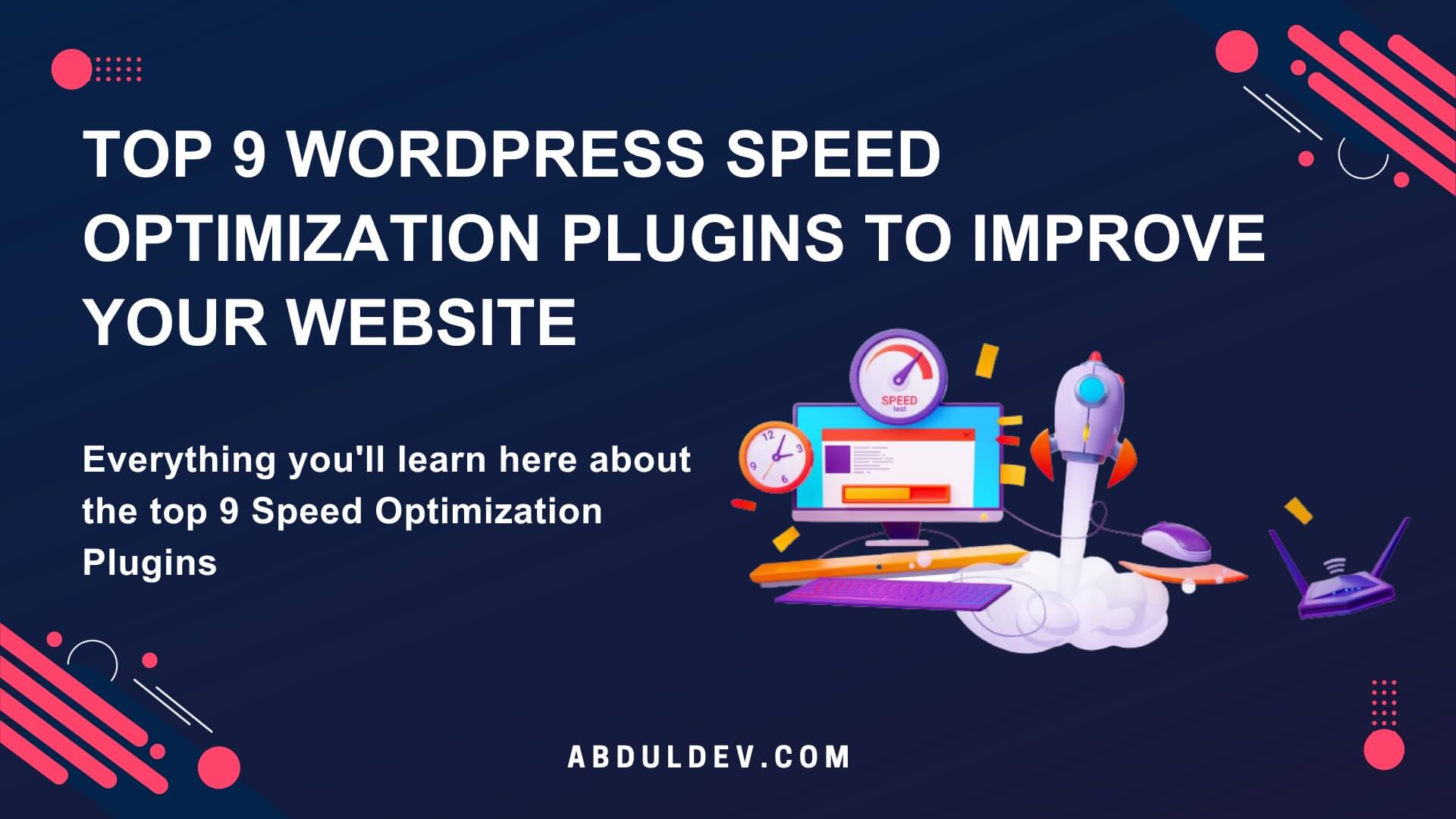
Top 9 WordPress Speed Optimization Plugins
Improve your website’s loading speed with the best speed optimization plugin available. Get faster load times and a better user
At AbdulDev, our mission is to support learners and developers by sharing helpful, easy-to-follow tutorials on modern web technologies like HTML, CSS, JavaScript, ReactJS, and PHP.
Useful Links
Copyright© 2025 | abduldev


